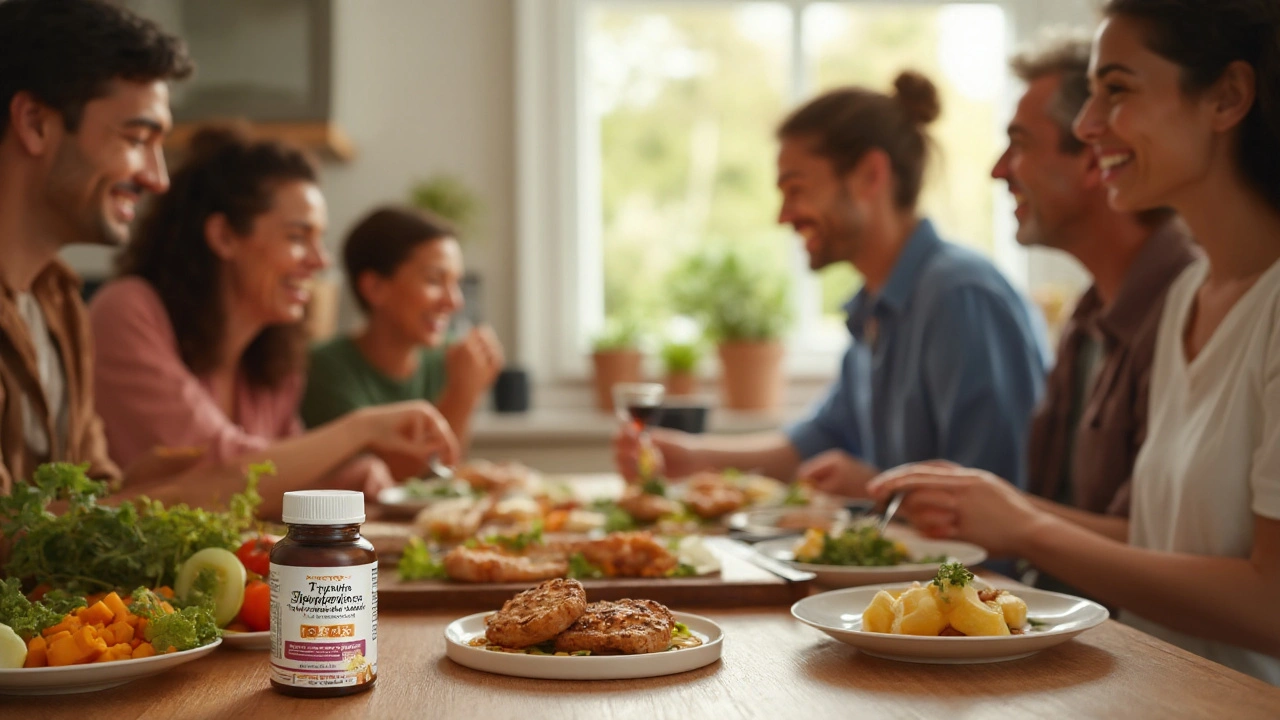Struggling with constant bloating, gas, or food not sitting right can turn every meal into a source of stress. So many people are searching for ways to tackle these digestion troubles at their roots, not just mask the symptoms. Enter trypsin—an enzyme that naturally helps our bodies break down proteins, but often gets overlooked. This article gives you plain answers on trypsin supplements: how they work, what real benefits (and limits) you’ll find, how to use them safely, how to compare products, and exactly what results you can expect for your digestive health in 2025. If you’re tired of one-size-fits-all advice and want clarity, practical help, and honest data, you’re in the right place.
- Trypsin supplements may help with protein digestion, reduce bloating, and support gut health, especially if your natural enzyme levels are low.
- Digestive enzyme supplements are not miracle cures and work best for specific problems—like pancreatic insufficiency or after-heavy-protein meals.
- Choosing a quality trypsin supplement means checking sources, potency, purity, and third-party test results.
- Some meds and conditions interact with trypsin—always talk to your doctor before starting any new supplement.
- Results vary by gut health baseline, diet, and other health factors. Expect gradual improvements rather than instant fixes.
How Trypsin Supplements Work and Why Your Digestion May Need Backup
Let’s keep this simple: Trypsin is an enzyme your pancreas makes to chop up proteins in your food into smaller bits called amino acids. Without enough trypsin (from age, stress, certain meds, or health problems), you may struggle with protein digestion. Maybe you eat steak and get a gut ache, or you notice undigested food in your stools. This isn’t just uncomfortable—it means your body can’t use all those proteins and nutrients efficiently.
Trypsin supplements jump in where your natural levels fall short. They’re usually part of a bigger enzyme blend, sometimes labeled as “pancreatic enzyme” or “protease supplement,” but trypsin is a key part. When you take them with food, they boost your digestive power, breaking down steak, eggs, or beans easier and leaving your gut less gassy and unhappy.
Why does this matter in 2025? More people are eating high-protein diets, and the average adult is more likely to have mild enzyme deficiencies, partly due to aging, gut issues, or even common meds. The best documented uses for trypsin supplements are:
- Supporting people with pancreatic enzyme insufficiency—such as from chronic pancreatitis, cystic fibrosis, or post-gallbladder surgery.
- Helping older adults or those recovering from gut infections who naturally have low enzyme output.
- Reducing feelings of heaviness and bloating after large protein-heavy meals.
The science? There are dozens of clinical trials showing enzyme supplements (including trypsin) help patients with pancreatic diseases absorb protein and nutrients better, reduce digestive symptoms, and improve quality of life. For healthy people, the impact is most noticeable when you’ve had digestive issues or major diet changes.
Real-Life Benefits: What Happens When You Add Trypsin to Your Routine?
Add trypsin supplements to your daily meals, and you probably won’t wake up with superpowers—which is a good thing. Most changes are gradual and low-key, especially if you stick to recommended doses. Here’s what to expect:
- Smaller, more regular bowel movements (protein breakdown = less undigested food in your stool).
- Less bloating, gas, and stomach heaviness after eating protein-rich foods.
- More energy and better mood (thanks to improved nutrient absorption—those amino acids build everything from brain signals to hormones).
- Reduced belching or “protein burps,” especially after heavy animal protein meals.
- More complete recovery and muscle repair if you’re active or athletic (because better protein digestion means more efficient use of amino acids).
Some people with sensitive stomachs or existing enzyme deficiencies report improvements within a few days. For others, it takes a couple of weeks to notice a change. Just remember: if your protein digestion is already fine, you might not feel much difference because your body is handling things well enough.
| Reported Benefit | When It Appears | Who Benefits Most |
|---|---|---|
| Less bloating/gas | Days to weeks | Low enzyme levels, protein-heavy diets |
| Regular stools | Within the first week | Older adults, chronic digestive issues |
| More energy | 2+ weeks | Those with nutrient absorption problems |
| Better muscle recovery | 2–3 weeks | Athletes/bodybuilders |
Are there downsides? Like anything else, yes. Some people (especially with ulcers or sensitive stomach linings) can get mild nausea or stomach pain if they overdo it or take trypsin on an empty stomach. So always start with the lowest dose and pair it with meals. And if you’re on blood-thinners or certain antibiotics, talk to your doc first—trypsin may interact or make matters worse.
How to Choose a Trypsin Supplement in 2025: What Actually Matters?
The supplement shelf in 2025 hasn’t gotten any less crowded. Every bottle claims miracles, but a smart choice comes down to these hard truths:
- Source: Most trypsin supplements are derived from porcine (pig) or bovine (cow) pancreas. Vegan enzyme formulas may use plant-based proteases, but true trypsin is animal-derived. If you’re concerned about allergies or religious/dietary constraints, read the label closely.
- Potency: Skip bottles that hide or skip the “USP units” or “activity per serving.” Look for at least 25,000–40,000 USP units of protease activity per daily dose for visible benefits, according to Mayo Clinic guidelines.
- Purity & Additives: Premium brands do third-party testing for purity, heavy metals, and microbial contamination. Avoid cheap blends that add calcium carbonate, cellulose, or “filler” enzymes, as these can dilute potency or trigger sensitivities.
- Blend vs. Isolate: Blended enzyme formulas (trypsin, chymotrypsin, lipase, amylase) may help if you need broad digestive support. If you want targeted protein digestion, a higher ratio of trypsin per dose is better. Read labels and check proportions.
- Testing & Transparency: Reputable brands publish third-party test results on their website or packaging. Look for batch numbers and expiry dates—freshness matters for enzymes!
Here’s a cheat-sheet—stick it in your notes for your next supplement run.
- Confirm it’s trypsin (not just any “protease”)
- Check for source—animal or plant-based (important for allergies or diet)
- Potency per serving in USP units or FIP (European measurement standard)
- Third-party test certifications for purity
- Expiry date and storage info—enzymes lose potency over time
| Key Criteria | Best Practice | Red Flag |
|---|---|---|
| Source | Porcine/bovine, clearly labeled | “Proprietary blend” secret source |
| Potency | USP/FIP units per capsule listed | No unit or “proprietary enzyme blend” |
| Purity | Third-party tested, batch shown | No testing/purity info |
| Formula type | Specific for your need (blend vs. single enzyme) | One-size-fits-all mega-mix |
| Expiration | 18–24 months, clear date | “Best by” with no batch info |
Expert tip: Keep your enzymes in a cool, dry place, away from humid bathrooms or kitchen counters. Heat and moisture kill activity fast in 2025’s climate-controlled homes.

Getting the Most Out of Your Supplement: Usage, Timing, Pitfalls
You bought a bottle. Now what? For best results (and avoiding wasted money), take trypsin supplements like this:
- Take with or immediately before a meal—never on an empty stomach unless instructed by your doctor.
- If you eat three meals, split your daily dose evenly—for example, 1 capsule per meal.
- Pair higher doses with high-protein meals (think steak, eggs, legumes). You don’t need to “over-supplement” light vegetarian or carb-heavy meals.
- Drink a full glass of water with each dose—a dry pill hanging out in your esophagus is bad news.
- Start on the lower end of dosing, especially if you haven’t taken enzymes before. You can always increase gradually if needed.
Pitfalls to avoid?
- Don’t expect results if you keep eating foods your gut hates (trypsin can’t fix lactose intolerance or celiac disease issues—different enzymes needed).
- Watch for sudden increases in hunger or loose stools—signs you may be overdoing the dose.
- If you’re taking antibiotics, anticoagulants (like warfarin), or have a history of ulcers, talk to your provider—trypsin can interact with meds or irritate your stomach lining if used carelessly.
- Don’t use enzymes to cover up serious digestive symptoms like ongoing pain, bloody stool, or unintentional weight loss. See a doctor always.
After a month, reassess: if you feel genuinely better—less bloated, more regular, fewer stomach upsets—you may be on the right track. If nothing changes, skip the next bottle—no need to waste money.
Comparisons, Alternatives, and When Trypsin Might Not Be Right
Let’s be real. Trypsin isn’t for everyone, and it isn’t the only answer. Sometimes other enzymes or even dietary tweaks are more useful. Here’s how it lines up against common alternatives in 2025:
| Enzyme Type | Best For | Limitations |
|---|---|---|
| Trypsin supplement | Protein digestion, pancreatic insufficiency, high-protein diets | Not for carb or fat issues; animal allergies |
| Lactase | Lactose intolerance (dairy digestion) | No help with protein/fat |
| Lipase | Fat digestion issues, gallbladder removal | No protein help |
| Plant-based protease | Vegetarian/vegan needs, mild protein help | May be weaker than animal trypsin |
| Probiotics | Gut flora balance, gas/bloating from fiber | No direct protein digestion |
Signs you *don’t* need trypsin: your bloating always comes from bread/pasta (it’s gluten or FODMAPs), you do fine with animal protein but get stomach pain with dairy (lactase needed), or you have no trouble digesting steak, beans, or eggs. Talk to your doc if your symptoms don’t match classic protein-digestion troubles.
Alternatives? If you’re plant-based, look for bromelain (pineapple enzyme) or papain (papaya enzyme) blends, which give mild help for protein breakdown. These won’t match true trypsin but are better than nothing for gentle support.
Mini-FAQ: Everything You’re Probably Wondering Right Now
- Can trypsin supplements help with IBS? Not directly—most IBS issues come from fiber or FODMAPs, not protein. Enzymes help if you have trouble after protein-rich meals only.
- Is continuous use safe? Most people can use quality trypsin supplements daily if they need it, but long-term safety data is still growing. Take breaks to see if your body adjusts over time.
- Are there food sources of trypsin? Your body makes its own; you can’t get significant trypsin from whole foods. Pineapple and papaya offer other enzymes but not true trypsin.
- Are supplements regulated? Yes—but regulation is looser than for medicines. Stick with brands that test batches and list full ingredients.
- What’s a ‘normal’ dose? 25,000–40,000 USP units of protease activity, split with meals, for most adults per Mayo Clinic and major academic sources.

What to Do Next: Who Should Try Trypsin (And Who Shouldn’t)
If you’re reading this and nodding along—lots of protein-rich meals, regular bloating, or inconsistent digestion after steak, eggs, or protein shakes—you’re a good candidate to try a supplement. If you’re vegan and eating lots of legumes and notice discomfort, try a blended plant and animal enzyme combo. Got lactose issues or trouble with carbs/fiber? Skip trypsin and look for different enzymes. And if you’re on prescription meds or have a health condition, have a quick chat with your doctor first.
Quick smart rule: Start low, keep notes, and stop if you don’t see a real change in a month. Your gut deserves tools that actually deliver—not just slick marketing promises.


Chelsea Caterer
August 22, 2025 AT 11:36Tried a low dose with dinner last month and wow less bloat, still tweaking tho lol
S O'Donnell
August 26, 2025 AT 18:22Trypsin dosing must be individualized to the patient's enzymatic output and dietary load.
Most clinicians who manage pancreatic insufficiency calibrate enzyme therapy not by a blanket capsule count but by correlating symptoms, weight trends, and quantitative stool fat testing when available.
Overprescription leads to waste and underprescription preserves malabsorption and its sequelae.
Enzymes are proteins and their activity is temperature and pH dependent so formulation matters significantly.
Enteric-coated microspheres designed to disintegrate at duodenal pH outperform simple tablets in many clinical series.
The USP and FIP activity units are not interchangeable without conversion and manufacturers sometimes obfuscate with proprietary blends which complicates dosing.
A practical approach is to target a protease activity within the recommended 25,000 to 40,000 USP unit range per day and then titrate with meals rather than exceeding three or four times the recommended amount.
Concomitant acid suppression is often necessary for gastric proteolytic survival in patients with hypochlorhydria especially in older adults, and failure to address gastric pH reduces delivered enzyme activity.
Pancreatic enzyme replacement therapy in chronic pancreatitis has robust evidence for improving nutrient absorption and pain in selected cohorts and should be considered before adjunctive measures are deployed.
In the ambulatory setting, clinicians should counsel patients about storage, expiry, and the fact that heat and humidity rapidly reduce activity, hence the use of desiccant containers and cool storage is evidence based.
Interaction with warfarin and other anticoagulants is plausible through altered vitamin K absorption and clinicians ought to monitor INR after initiation.
Allergic sensitization is rare but not nonexistent particularly with porcine derived products and patients with religious or ethical restrictions need alternatives such as plant proteases albeit with lower activity.
Long term safety data is evolving and the observational nature of many studies demands conservative interpretation while still recognizing clinically meaningful symptom relief in many patients.
Patient reported outcomes often lag behind objective measures of absorption because neurologic and mood improvements stem from corrected micronutrient profiles that rebuild slowly.
There is no omnipotent supplement and enzymes should be part of a comprehensive strategy including dietary modification, treatment of small intestinal bacterial overgrowth if present and targeted use of probiotics where indicated.
Clinicians and lay users alike should prioritize transparency and third party verification when selecting products because regulatory oversight remains limited.
Katelyn Johnson
August 31, 2025 AT 01:09Good point about matching formulation to the problem
Blends help some people but clear labeling is everything
Keeping a one week symptom log while you try a new brand makes it easier to see real change
Also small habits like not taking enzymes on an empty stomach and splitting doses are low effort and actually helpful
Elaine Curry
September 4, 2025 AT 07:56Started after gallbladder surgery and took what my cousin gave me, ended up with tummy ache for two days so learned quick that not all pills are equal
I now bring the bottle to my GP and ask them to check labels they laugh but then point out enteric vs plain capsules
Also I keep mine in a small zip bag in the fridge when it's warm here because humidity wrecked one bottle last summer
Do not pop them like vitamins, take with the meal that needs help and sip water
Patrick Fortunato
September 8, 2025 AT 14:42Fridge storage is sensible
Cheap imports often lack transparency
Mark Rohde
September 12, 2025 AT 21:29Life changing tbh lol 😅
Less bloat after steak 😍
More energy
Buy good stuff not the 5 dollar junk
Rajan Desai
September 17, 2025 AT 04:16Practical dosing guidance is useful
For adults with suspected low protease output, aim for a total daily protease activity in the 25,000–40,000 USP unit range, divided across protein-containing meals.
Begin with the lower end of that range and increase incrementally while documenting stool form, bloating, and satiety.
Prefer enteric-coated formulations where available to ensure delivery to the duodenum.
Avoid taking high protease doses on empty stomach to reduce mucosal irritation risk.
Monitor concomitant medications, particularly anticoagulants, and arrange follow up labs if clinical concern exists for malabsorption.
Yamunanagar Hulchul
September 21, 2025 AT 11:02Thank you for those clear steps!!!
Start slow and track it every day, even a tiny notebook helps you notice patterns 😊
Also celebrate small wins like a single meal without bloating, that matters so much for morale!!!